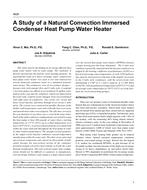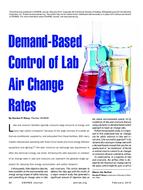ASHRAE Research Project 1121-RP Evaluating the Ability of Unitary Equipment to Maintain Adequate Space Humidity Levels: Phase 1, has been established to develop a plan to guide the evaluation of humidity control by unitary HVAC equipment. Phase 2 of the project will involve an analysis, using computer simulation, based on the evaluation plan. This report describes the evaluation plan, including the climates, building types, HVAC equipment options, and computer simulation program requirements.
The plan is based on separate evaluations of humidity control options and load requirements of commercial buildings, which are described in interim project reports by Brandemuehl (2000) and Brandemuehl and Katejanekarn (2000). The analysis of humidity control options explored and described the range of unitary equipment options to address humidity control in common commercial building application. The equipment included DX vapor compression equipment, modifications to DX systems, enthalpy recovery devices, desiccant dehumidification systems, and demand controlled ventilation. The analysis of building load characteristics sought to identify and describe key factors that affect humidity control in various generic commercial building applications. It involved review of the literature on dehumidification applications as well as an analysis of dehumidification loads in common commercial building applications.
The evaluation plan provided here describes a detailed set of computer simulations to evaluate the ability of unitary HVAC equipment to address humidity control issues in generic commercial building types. The plan describes five different commercial buildings, including physical and thermal building characteristics, schedules for loads and operations, and requirements for ventilation. Eight locations have been selected to represent the range of climatic conditions and HVAC markets in which dehumidification is important. The cooling and dehumidification requirements for each of these buildings, in each location, are to be evaluated with each of seventeen HVAC equipment options. The complete set involves 1360 annual simulations. The results of these simulations will be used to identify the performance of the various humidity control options in different applications and will provide guidance to design engineers and building operators.”
Product Details
- Published:
- 2002
- File Size:
- 1 file , 1.8 MB
- Product Code(s):
- D-28816


